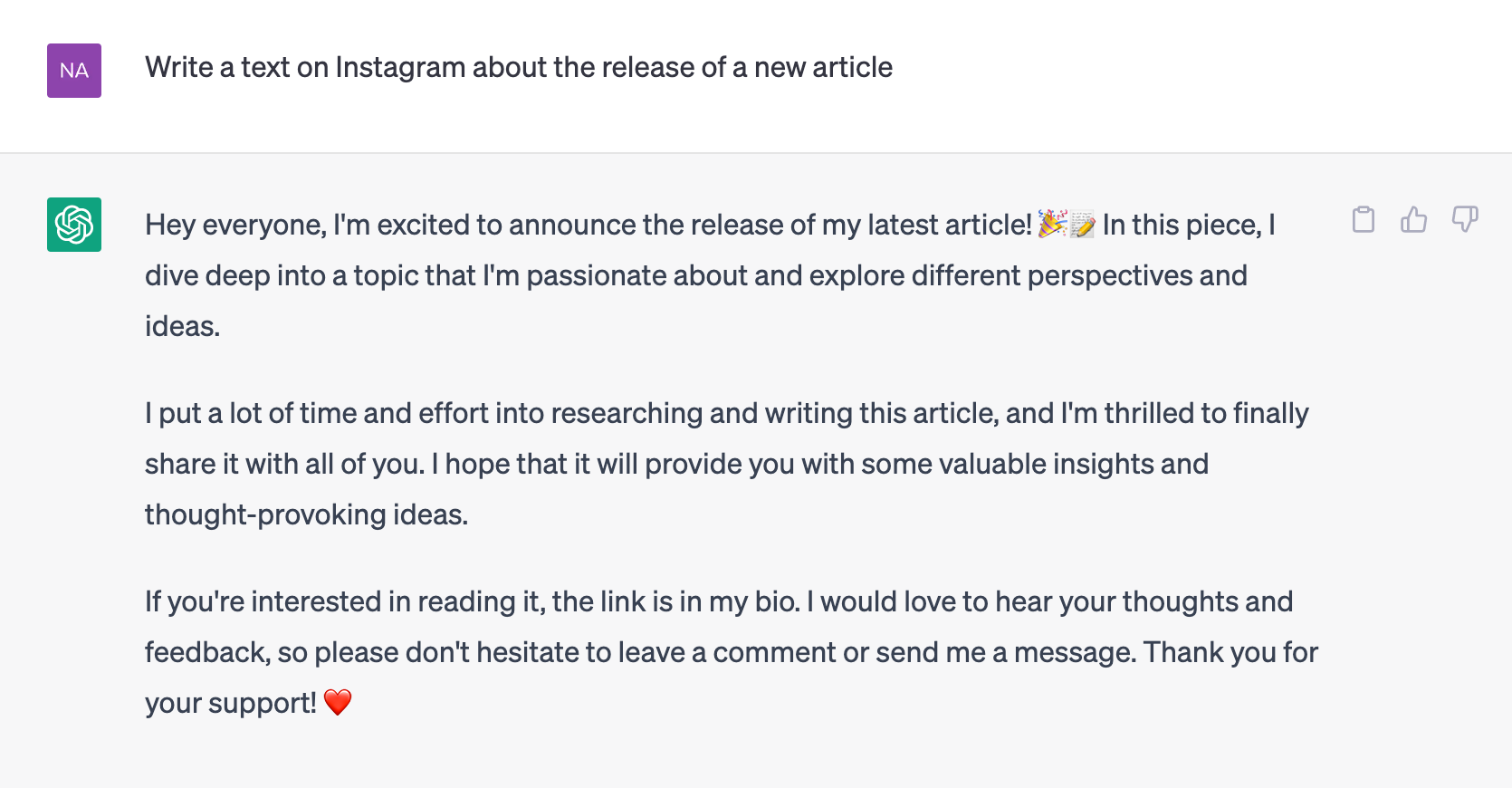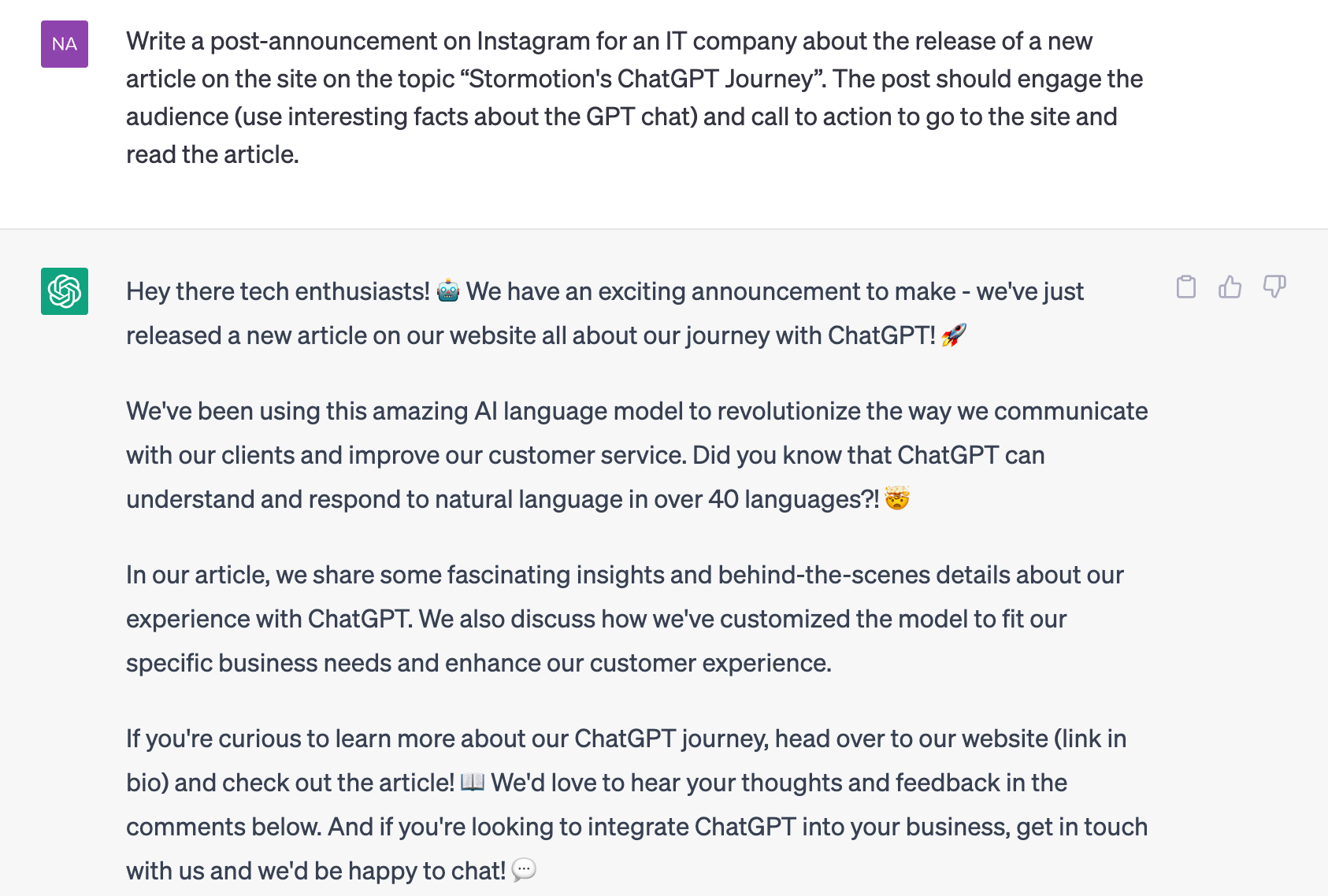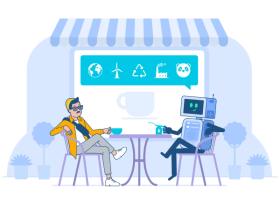Stormotion's ChatGPT Journey
Published: August 16, 2024
10 min read
In this article, you'll learn:
1
⚖️ 🤓 Exploring the Pros and Cons of ChatGPT
2
📬Stormotion’s Marketing with ChatGPT
3
✅ ChatGPT Masterclass
4
🧑💻 Stormotion's Technical Department and ChatGPT
5
📚Case Study
6
🖥️ The Future of AI in IT-Companies
7
👂Takeaways

I don't think that artificial intelligence will completely replace human workers, but I do think teams that leverage the power of AI will outperform those that don't.
Roman Bord, CEO of Stormotion
Currently, artificial intelligence (AI) continues to change our world, improving the work and lives of people. This technology has long been an indispensable tool in healthcare, finance, manufacturing, automotive and transport industries, education and technology. For example, thanks to AI, traffic flow can be monitored.
Since the GPT chat was introduced by OpenAI in November 2022, everyone has been trying to use it, assign various tasks to it, learn something new and, in principle, communicate with artificial intelligence!
But what’s artificial intelligence? It’s a field of computer science that uses algorithms to create programs that can perform tasks that require human intelligence. Artificial intelligence includes technologies such as machine learning, deep learning, neural networks, and others.
In addition to private use, chatGPT is gaining popularity among companies. The use of AI is beginning to be introduced into the work of employees to save resources. In February 2023, about a quarter of America's leading companies saved between $50,000 and $70,000 using ChatGPT. In addition, 11% said they have saved over $100k since implementing ChatGPT into their workflow (Statista). Impressive, right?
Stormotion has prepared an article for you where we’ll share our experience of using chatGPT, what are its disadvantages and advantages and share with you a couple of life hacks on how to get the maximum benefit from artificial intelligence in simplifying project work. Let’s go!
⚖️ 🤓 Exploring the Pros and Cons of ChatGPT
First, let's learn a little more about chatGPT.
Its history is closely connected with the development of natural language processing (NLP) and artificial intelligence (AI) technologies. The roots of the technology go back to the middle of the 20th century, when researchers began to explore the possibility of creating machines that could understand and speak human language.
One of the first chatbots was developed by Joseph Weizenbaum of the Massachusetts Institute of Technology in the 1960s. A program called ELIZA uses pattern-matching algorithms to simulate a conversation with a psychotherapist. Despite its simplicity, ELIZA was a seminal achievement that sparked interest in the field of NLP.
Over the years, researchers and developers have continued to refine and improve chatbot technology, culminating in the OpenAI GPT (Generative Pre-Trained Transformer) language model in 2018. The model uses deep learning to generate human-like responses to text prompts, paving the way for more advanced chatbots like Chat GPT.
This chatbot uses deep learning to generate human-like responses to text queries, making them a valuable tool to improve user experience and improve customer service across industries.
However, like any technology, Chat GPT has its advantages and disadvantages. Let's take a look at them below.
Pros
- Fast response time.
The GPT chatbot provides quick answers and can find the information you need. - Round-the-clock availability
- Reduce costs by automating certain processes and tasks.
- Personalized interaction.
The chatbot can help create text based on specific requests such as target audience, style, or topic. - Collection and analysis of data
- Integration with various platforms
Cons
- Possible inaccuracies and unconfirmed information.
Some users may have noticed that links to sources and statistics provided by the chatbot are sometimes unreliable. - Privacy and security concerns.
Chat GPT collects customer data, which may cause privacy issues for those who don't want to share their information with the machine. - Significant investment in technology, service and training for effective implementation
- The Chat GPT may not be able to effectively communicate with certain languages and dialects.
- Bias and lack of empathy.
The AI reproduces data it has learned from, which may include discriminatory or biased statements. This can lead to unintentional stereotyping by the chatbot.
As you can see, ChatGPT can help your business streamline some processes and save important resources. BUT, it’s essential to remember and take into account all the disadvantages of this chatbot.
At Stormotion, we believe that a chatbot is a good auxiliary tool, but so far it’s not a replaceable employee or an entire department of a company. And you will learn more about us and our experience in working with artificial intelligence in the following sections! Continue reading!
📬Stormotion’s Marketing with ChatGPT
In this section, we’ll share with you our experience with artificial intelligence in the marketing field.

Current advancements in AI, including ChatGPT and Midjourney, are a game-changer not seen in years. While fact-checking is necessary due to its generalized responses, it excels in transforming text from one style to another. Its capabilities extend to handling numerous other text-related tasks such as writing emails, creating customer tickets, and generating reports. To achieve this, it’s crucial to provide ChatGPT with sufficient context and description of the task. This greatly enhances productivity, reduces costs, and enables us to serve our clients more efficiently.
Roman Bord, CEO of Stormotion
Our marketing strategy is a constant search for innovative ways to attract attention to the company and increase brand awareness. And of course, we immediately ran to test ChatGPT to create content for our social networks.
One of the main aforementioned benefits of using ChatGPT is its ability to produce texts that grab attention and engage the audience. While it's true that Chat GPT can indeed write engaging text, it often does so superficially and the texts require further refinement. Frequently, the texts proposed by artificial intelligence still needed to be finalized.

You can automate your email marketing with the help of AI.
(image by Eugen Eşanu)
Another challenge that Stormotion has set for the GPT chat is to generate new hot topics for content. ChatGPT did a better job with this task, it generated numerous ideas and topics for new articles, and our employees again finalized them and prescribed them in the content plan.
Creating original and quality content is still of paramount importance to our marketing department, even when using ChatGPT the texts must be adapted to our needs. Of course, there are some small tasks that we don't want to spend excess time on, and the GPT chat helps out a lot.
Conclusion #1.
ChatGPT helps us save time, but does not work for us in any way:)
✅ ChatGPT Masterclass
Probably everyone who used artificial intelligence came to the conclusion that the correct formulation of the request plays an important role. If you want to get the most out of using ChatGPT, then you need to be able to formulate them correctly.
We have prepared a mini-guide for you, where you will find some actionable tips on how to correctly make a request to ChatGPT and get an accurate and informative answer.
- Start with action.
What should be done? Write a text, explain the topic, draw conclusions from the article, suggest options for topics, and so on.
For example: Write a text on Instagram about the release of a new article.

GPT Chat coped with the writing of the text, but is it suitable for our Instagram? Not really. (image by Stormotion)
- Add some context.
What should be the text? What important topics should be covered in it? Who is this text for? Who is this text from?
For example: Write a text on the company's Instagram IT about the release of a new article on the company's website about working with the GPT chat.
- Add more specifics.
This will make it easier for the chatbot to generate the right text for you.
For example: Write a text on the Instagram IT company about the release of a new article on the site on the topic “Stormotion's ChatGPT Journey”.
- Set the text size.
The number of words, symbols or concepts.
For example: Write a post-announcement on Instagram for an IT company about the release of a new article on the site on the topic “Stormotion's ChatGPT Journey”.
- Help the chatbot.
In your request, the main thing is to prescribe detailed instructions.
For example: Write a post-announcement on Instagram for an IT company about the release of a new article on the site on the topic “Stormotion's ChatGPT Journey”. The post should engage the audience (use interesting facts about the GPT chat) and call to action to go to the site and read the article.
- Write grammatically correct.
Do not use abbreviations and try not to make mistakes in the text. It will be easier for the chatbot to process information.

Look how important it is to correctly formulate a request to the GPT chat for a good result. Of course, we would make some changes to this text, but it's already pretty good! (image by Stormotion)
Ready! Your request has been generated and is ready to be used for the benefit of your company!
Conclusion #2.
The correct wording of the request is the key to a successful result.
🧑💻 Stormotion's Technical Department and ChatGPT
At Stormotion, we use ChatGPT in our technical department too. In this section, we’ll talk about our experience of using AI and its features in working with our technical problems.

Our extensive use of Hasura in our projects has enabled us to quickly build efficient and secure GraphQL APIs on top of Postgres databases. However, as TypeScript-focused engineers, writing advanced SQL has always been a bottleneck for us. While we can implement any business logic in TypeScript right away, even simple SQL tasks can be a challenging task. This is where ChatGPT has truly shined for us - tasks such as developing something in a language, technology, or stack we don't use on a daily basis unleashes the full potential of ChatGPT.
Oleksii Bulavka, CTO of Stormotion
However, we've also noticed that ChatGPT isn't perfect with math and sometimes comes up with incorrect numbers. Therefore, in such cases, we prefer to perform calculations manually to be sure of their accuracy.
Despite this, ChatGPT can handle other small tasks in the work of the technical department. For example, recently a chatbot wrote us the necessary regex and one js function for 50 characters. Not that it would speed up the work, because the developer still had to double-check the code, but it was an interesting experience for our employees.

Provide chatGPT with enough data so that it can understand the problem and generate code to solve it. (image by Maciej Dyjak)
We appreciate the opportunities that ChatGPT provides and successfully use it in our work on some tasks. But, artificial intelligence is not able to replace a highly skilled developer.
Conclusion #3.
AI can be a great help in a non-work related topic.
📚Case Study
In this section, we'd love to share our case of using ChatGPT with a real client.
Stormotion has a project whose sponsor regularly receives tax credits for investments in Research & Development. However, sometimes it is difficult to prove that the work refers specifically to R&D. To get these deductions, we must provide high-quality inputs that prove our scientific work.
We decided to test the strength of ChatGPT and asked it to help with the formulation of hypotheses. For this, we take a brief hypothesis from this project and the rest of the necessary items such as method, measurements, and result. We then pass it all on to our helper (read as ChatGPT) and ask for extended & prettified text using scientific vocabulary.
This experience with ChatGPT has given us the ability to more convincingly and scientifically describe our hypotheses. However, the result directly depends on the properly & meaningfully formulated request. In such work, it is essential to convey the right context and convincing arguments so that the results are as matching and relevant as possible.
🖥️ The Future of AI in IT-Companies
Artificial intelligence has already led to significant changes in various industries and continues to be the driving force behind new technologies such as big data, robotics and the Internet of Things. AI tools such as ChatGPT and image generators are gaining more and more attention, and companies are increasingly investing in and integrating AI into their business. IBM, for example, received over 2,300 AI patents in 2021.
AI has not only transformed traditional computing methods, but has also penetrated many industries, fundamentally transforming them. As the world becomes more digital and all industries become smarter, IT companies must keep pace with rapidly increasing complexity and accelerating innovation. But what will these innovations be?
It’s difficult to answer this question. What’s certain is that the use of AI in IT companies will increase efficiency and quality, help create new products and services, which will significantly change the modern familiar picture.
AI is a constant development. Its future may be full of new opportunities and help for people, as well as challenges and risks that will require the development of new rules and standards to ensure safe and ethical use. However, the future of AI depends on how we use and develop this technology.
👂Takeaways
We hope that this article has been informative and inspiring for you on the topic of artificial intelligence. The main points are as follows:
- AI technology is rapidly advancing, and staying up-to-date with these innovations is crucial for the success of any business.
- ChatGPT is a helpful tool, but it can't completely take the position of human workers.
- It's essential to formulate requests to GPT Chat accurately to receive high-quality answers.
- Using GPT Chat can save time on certain tasks, but it's important to use it effectively and efficiently.
If you have any questions about artificial intelligence or Chat GPT, please don't hesitate to reach out to us!
Our clients say
![Stormotion client Pietro Saccomani, Founder from [object Object]](/static/40e913b6c17071a400d1a1c693a17319/b0e74/pietro.png)
They make the whole business work for us, and their improvements are fundamental to our operations. They’re reliable, honest, and willing to try new things that will help us. We appreciate how flexible and easygoing they are.
Pietro Saccomani, Founder
MobiLoud
Was it helpful?
Questions you may have
Take a look at how we solve challenges to meet project requirements
How can AI help IT companies increase efficiency and quality?
AI can help IT companies by automating repetitive tasks, providing insights from large amounts of data, and assisting with problem-solving and decision-making.
What are some tips for formulating a request to ChatGPT?
The tips include starting with an action, adding context, providing specifics, setting text size, helping the chatbot with detailed instructions, and writing grammatically correct.
What’s the reason why GPT chatbot sometimes provides unreliable information?
One of the key reasons is that the AI model primarily depends on the data it was trained on; if the data contains errors, biases, or out-of-date information, the chatbot may respond in a way that is deceptive or inaccurate.
Read also


